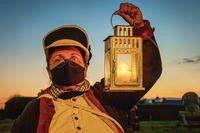Could changes to U.S. policy have prevented World War II? Could Americans have stopped the mass murder of millions of Jews and others the Nazi government found undesirable? Or should we have followed the recommendations of a large "America First" contingent and stayed out of the conflict altogether and let Europe sort itself out under Nazi rule?
Documentary filmmakers Ken Burns, Lynn Novick and Sarah Botstein confront these questions head-on in "The U.S. and the Holocaust," a new seven-hour documentary series airing in three parts September 18, 20 and 21, 2022 on PBS stations around the country, available to stream in the PBS app and available for purchase on digital, Blu-ray and DVD. The new series operates as a companion to “The War,” Burns’ 2007 documentary about the history of World War II.
The documentary is exactly as described in the title, focusing on the history of U.S. immigration policy, how the homegrown "racial science" of Eugenics inspired Hitler, how Jim Crow laws in the South provided a model for the first German laws limiting the rights of its Jewish citizens and how strong pro-isolationist public opinion limited the White House's ability to act on intel it received about Nazi brutality before the Japanese attack on Pearl Harbor.

The film also offers some perspective by emphasizing the fact that most of the Nazi mass murders took place in Eastern Europe, far beyond the range of Allied aircraft at the time of the worst killings. Would stronger condemnation from Americans have slowed the Nazi killing machine? Evidence suggests that nothing would have slowed Hitler's plans at that point, especially not shaming from other countries.
One American who gets eviscerated by the filmmakers is aviation legend Charles A. Lindbergh. Rather than employ a series of talking-head historians to talk about Lindbergh's leadership of the America First movement and shocking anti-Semitism, the documentary features film footage and audio recordings of Lindbergh's own speeches to demonstrate the man's beliefs. It's one thing to read these statements quoted in a Lindbergh biography and another entirely to actually hear the words come from his mouth.
The State Department also gets put under the microscope, and the film reveals a consistent pattern of downplaying or even lying about the intelligence it was getting from Europe. Secretary of State Cordell Hull was determined to keep immigrants out of the country and largely succeeded until the evidence of war crimes became overwhelming in late 1943.
President Franklin D. Roosevelt finally established the War Refugee Board in January 1944, and from that point onward, American agents provided aid and spread money around Europe in an effort to rescue as many refugees as possible.
Burns and his team aren't offering a list of suggestions as to how Americans could have prevented the Holocaust or even significantly lessened its impact on the Europeans targeted for murder by the Nazi regime. There were political forces at work in the U.S. that prevented an early understanding of what was happening in Europe and an intense effort to set things right once those political forces had shifted.
Most inspiring is the story of Guy Stern, a German Jewish refugee from Nazi Germany who joined the U.S. Army and landed with Allied Forces at Normandy just after D-Day as part of an Army Intelligence Unit. After we hear the story of Stern's happy childhood in pre-Nazi Germany, his family's struggles after Hitler took power and the trauma of his emigration, it's a great moment to see him describe his military service.

"The U.S. and the Holocaust" doesn't end on a high note, however. The filmmakers wrap up with a montage of news footage that shows the worst of the contemporary anti-immigrant sentiment that drives so much of the political conversation in the 21st century. Burns, Novick and Botstein then let their historians make the connection between contemporary attitudes and the movements that aimed to keep us out of World War II.
Keep Up With the Best in Military Entertainment
Whether you're looking for news and entertainment, thinking of joining the military or keeping up with military life and benefits, Military.com has you covered. Subscribe to the Military.com newsletter to have military news, updates and resources delivered straight to your inbox.








